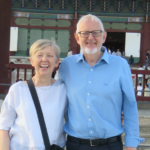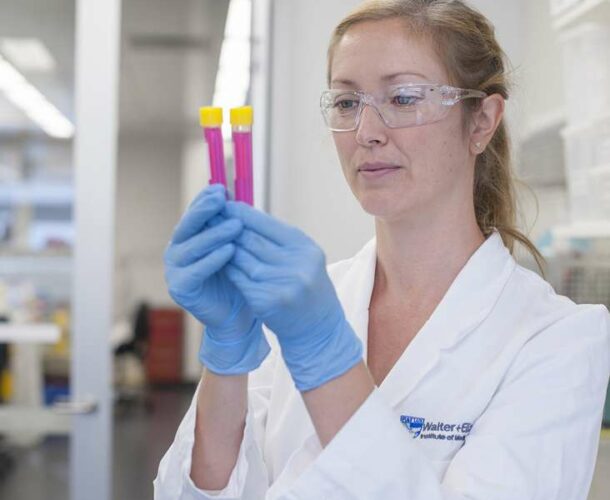Dr Tracy Putoczki and Associate Professor Matthias Ernst show that interleukin-11 is one of the most important cytokines that stimulates the growth and spread of cancers.
Working with scientists at the Melbourne-based pharmaceutical company CSL Ltd, they discover that blocking interleukin-11 in models of stomach and bowel cancer stopped tumour growth and could lead to tumour shrinkage.
Putoczki says this makes interleukin-11 a promising potential new target for treating many types of solid cancers.
Finding her science path
It took what she calls “an early life crisis” and a couple of detours for Putoczki to find the scientific path she would be content to spend her career pursuing.
Initially Putoczki completed a pre-medical degree in her native Canada, but then decided against medical practice. She shifted tack into biochemistry, studying a protein in pine trees, but ultimately determined that assisting forestry companies to boost their profits “wasn’t really where I wanted to put my effort and my heart”. The next turn was into medical research, focusing on stomach, colon and later pancreatic cancers.
Investigating mechanisms to tackle these gastrointestinal diseases, which rarely show themselves until it is too late to effectively slow or stop them with treatments, resonated with purpose. “The main reasons I chose those cancers came from personal history – family members and friends who died from these diseases,” Putoczki says. “My PhD supervisor died from colorectal cancer during my studies.”
Striving for new treatments
For her a clear sense of mission, and a belief in its value, is critical. As medical researchers, “we donate our lives and our brains to what we do, and hopefully by the time we get to the end of our careers we’ve discovered something exciting, that we’ve helped to make available in the hospital, something that patients are receiving, that is improving their lives”.
Now nine years down the track in her research – still early days in a research career – Putoczki and her colleagues have identified a particular area of cellular communication as having the potential to throw a spanner in the works of gastrointestinal tumours. Her interest is in “the ways that cells talk to each other, and one of those conversations was originally discovered here at the Walter and Eliza Hall Institute”. Hence she joined the institute just under three years ago to “carry on the legacy of working out what that conversation means, and applying that knowledge specifically to the cancers I study”. She is now supported by a Centenary Fellowship, funded by the Dyson Bequest.
Eavesdropping on cytokine families
The cytokine “family” she’s primarily eavesdropping on is referred to as the interleukin-6 family. It’s a soluble molecule that is closely related to another protein, interleukin-11, whose receptor was first cloned at the institute by now director, Professor Doug Hilton and a team of prominent scientists. “Imagine them like a telephone conversation,” Putoczki explains. “The words you speak are the molecule, the receptor is the phone receiver, and the conversation is the signal that then goes through to the cancer cell on the other end”.
“Making sure the correct signal goes through is part of what we are looking at. Also what might send it awry, and if it does go awry, how can we get it back on track to stop the misinterpretation of a conversation between cells.”
When a tumour develops, non-cancerous tissue around it becomes recruited into an inflammatory response, producing these cytokines that appear to promote the growth and spread of cancer cells. “Inflammation occurs when cells come in to fix a problem, with good intention to start with, but sometimes something goes wrong … resulting in a miscommunication between the cells”.
Cancer cells apply “peer pressure”
“It’s like peer pressure – healthy cells are being to told they should do a certain thing by cancer cells, and eventually they give in. The healthy cells need positive pressure from the good cells – to interrupt them, or change the focus of the conversation to keep them in check.
“If we can control the cells around a tumour – normal cells which are being pressured to join the gang – then we can control how that tumour grows.” This has powerful potential, especially for people who have particular genetic mutations that increase their risk of these dangerous cancers.
Putoczki and her colleagues are working closely with CSL to produce drugs that inhibit damaging chatter between cells. These are now being put through a preclinical screening process, combining them with standard chemotherapy treatments, and hopefully in the next five years will advance into clinical screening.
If the knowledge that she generates from cancers can be applied to other diseases, its important to her that she is able share these discoveries. Her laboratory is also investigating the potential of the therapy for autoimmune diseases such as multiple sclerosis, which is driven by the same kind of damaging cellular interactions.
Promising signs
The signs are promising, but there is still a long haul stretching ahead and Putoczki’s happy to be patient. “There is a danger in pushing new drugs too quickly. Many drugs fail when they are first given to patients because of side-effects. We need to understand how our new drugs are going to affect other parts of the body as well. I don’t want to jump in too early, because I don’t want to see my life’s work fail because we got over-excited. That wouldn’t help anyone.”
As well as her bench work, Putoczki is passionate about raising public recognition of women in science. She’s dismayed that when school children are asked to draw a scientist, inevitably they still draw a picture of a man in a white coat. Finding a way to change that is another galvanising mission.









